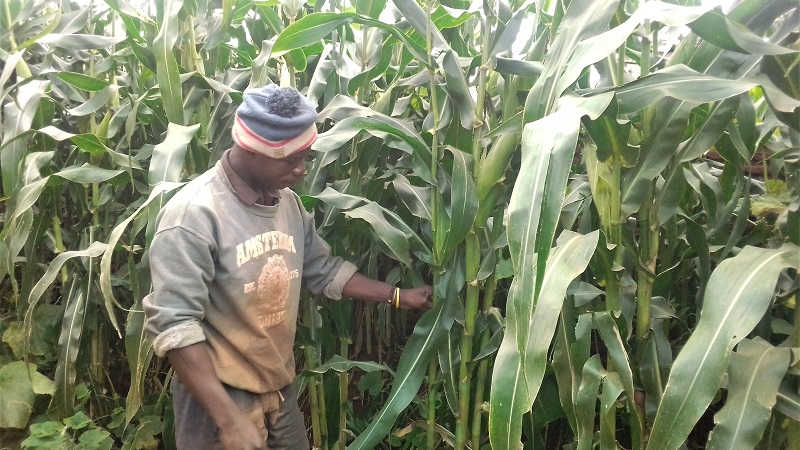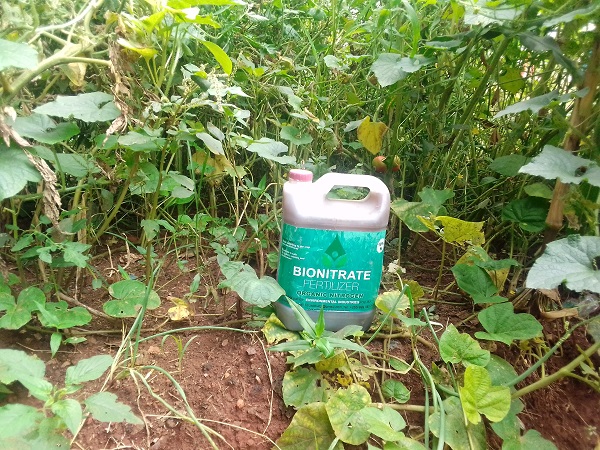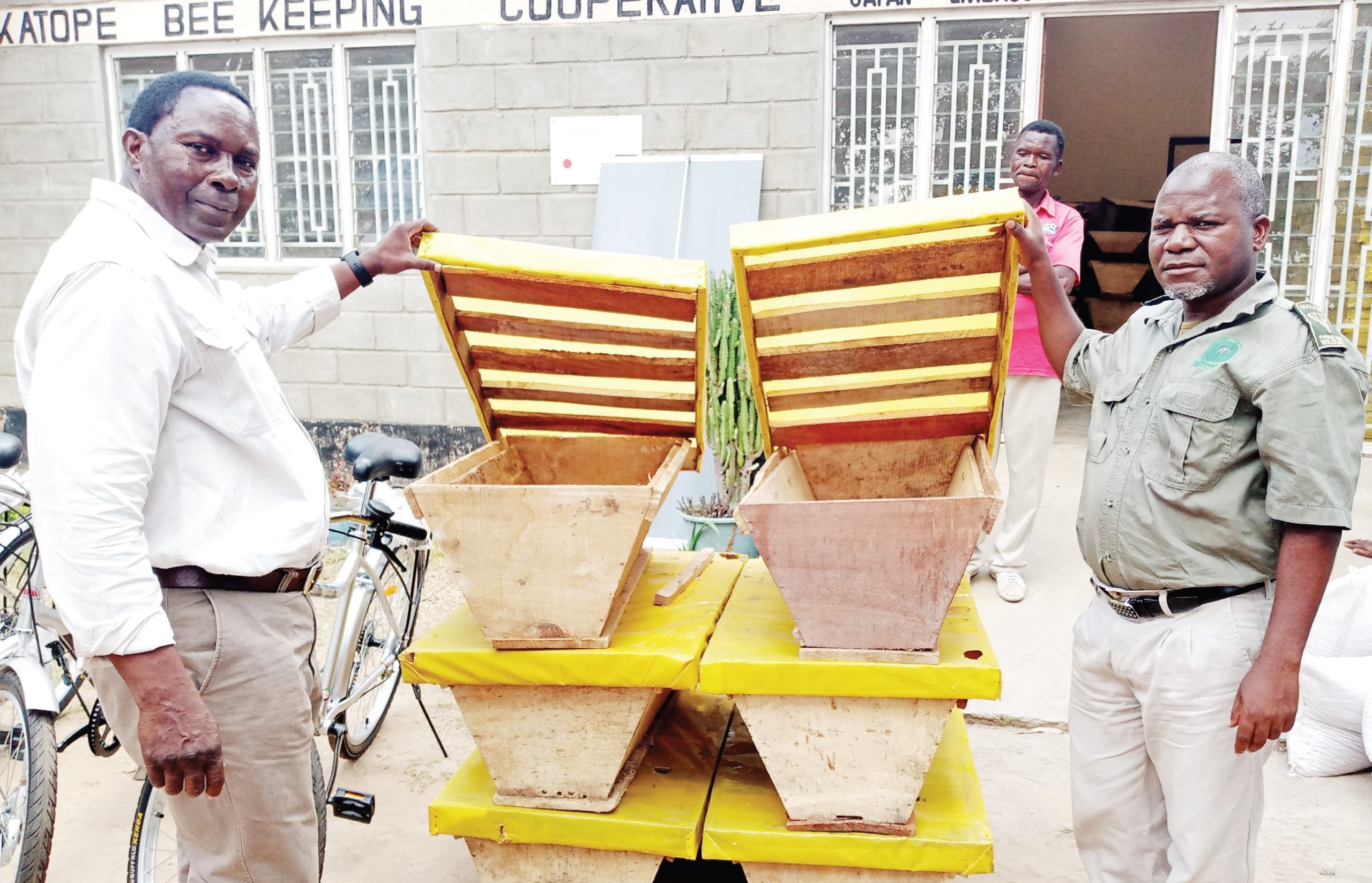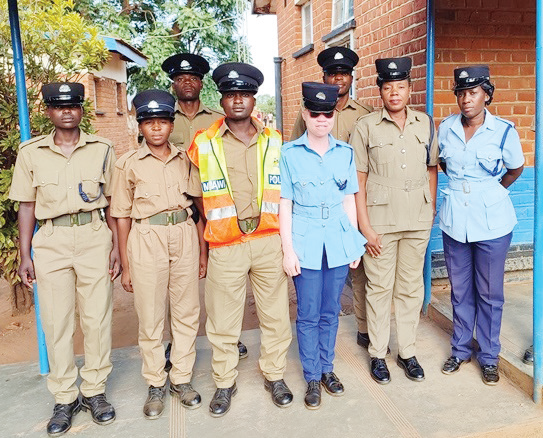Farmers grow crops with ‘magic liquid’ fertiliser
‘Bionitrate’ made from urine is starting to improve yields for farmers in Malawi who face high costs applying fertiliser to maize and other crops amid shifting weather patterns, MADALITSO KATETA writes:
Farmers in Neno District are happy with the impact of the ‘magic liquid’ on their crops—especially as the fertiliser is free, readily available and renewable.

The subsistence farmers and their families collect the urine they pass—most keep a plastic vessel in their bedroom for use at night— and store it in containers where it matures and turns into fertiliser worth about $0.47 a litre, cheaper than the chemical rivals.
The system is a shift from the use of pit latrines where the urine seeps away into the ground.
“This fertiliser is very effective on crops; it works just like most of the chemical fertilisers but it quickly reacts on the crops as opposed to the chemical fertilisers,” said Mark Folopenzi, a 45-year old farmer in Neno who lives with his wife and three children and uses the magic fertiliser.
Malawi has a largely agricultural economy, with more than 80 percent of its population in rural areas and earning a living through subsistence farming, growing rain-fed crops including maize, sorghum, pulses and millet. In a bid to improve agricultural productivity among subsistence farmers, the government of Malawi has since 2005 been implementing the Farm Input Subsidy Programme (Fisp), which has been lauded for increasing maize yields and rural incomes.
The programme, which was targeting around one million of the country’s 11 million smallholder farmers, was costing about K42 billion.
However, despite this expenditure, the programme did not necessarily empower subsistence farmers, as year in and year out they sought relief from government due to hunger as a result of unpredictable weather patterns.

In 2020, the Tonse Alliance administration led by President Lazarus Chakwera replaced Fisp with the Affordable Inputs Programme (AIP) which was initially set to benefit 4.2 million households at a cost of K60 billion.
At the launch of the programme in Zomba Chakwera at Pirimiti Boys Primary School in the area of Traditional Authority (TA) Mwambo in Zomba in October last year Chakwera described AIP as an injection that would drive the country’s economy.
Chakwera said the country has been a poor and famine-infested nation because very few farming households had a chance to access the cheap and affordable farming inputs, saying the AIP targets 4,279,100 farming households across the country.
He said his government abolished Fisp because only few were benefitting and that there were a lot of loopholes that gave ill-minded people an opportunity to steal from poor farmers.
High population growth, deforestation and erosion make the economy especially vulnerable to worsening climate change. The impact of erratic rains, prolonged dry spells and severe floods has been aggravated by a lack of agricultural resources, including fertilisers.
While farmers face many challenges, the biggest cause of crop failure is low rainfall and low nutrients in the soil. Maize, the country’s staple crop, demands lots of nutrients, and growing the plant without fertilisers is difficult.
A study by the International Food Policy Research Institute found that while subsidising fertiliser prices increases use, yields, and household income, it discourages use of organic-based materials and methods to maintain soil fertility.
With the ever-rising cost of chemical fertilisers, subsistence farmers in Malawi have been finding it hard to afford chemical fertilisers, and they have been trying to find affordable and sustainable alternatives – such as urine.
Folopenzi said the introduction of bionitrate fertiliser, which is made by maturing human urine in plastic containers, has helped farmers amid the ever-rising costs.
“We can’t grow crops without applying fertilisers as we used to some 15 years ago. The soil has over the years lost its fertility and growing crops without fertiliser results in bad harvest and hunger,” said Folopenzi.
“This [bionitrate] fertiliser is very good and we are excited that we can also save a lot of money if we can produce our own fertiliser from the urine we can collect at home,” he said.
Sabawo Chikuni, another farmer from Neno, was previously worried the bionitrate fertiliser was unhygienic and could be infected with parasites. But having seen its effects, he now plans to use the fertiliser in the winter cropping season.
“I previously had negative feelings on the use of human urine on crops. I felt like this could not be a better alternative to chemical fertilisers. But looking at how the maize in the gardens of farmers that are using this fertiliser has grown, I believe government could be doing us justice if it promoted this fertiliser,” he said.
Bionitrate fertiliser is being championed by Environmental Industries, a private non-profit company that has been working with different local and international organisations in Malawi to promote the use of biotechnology and produce fertilisers which are economically sustainable, environmentally friendly, and safe to use.
Governments urged to attach green strings to long-term coronavirus recovery plans
Goodfellow Phiri, director at Environmental Industries, said bionitrate fertilisers are safe to use and do not pose any health hazards, despite health and ethical questions raised by some farmers.
He said before the urine is turned into fertiliser, it ages and the chemical processes in the urine turn it from an acid to an alkaline, making the product very salty and not habitable for germs.
“In the alkaline state, the PH is beyond seven and the product is salty. In this salty state, all the germs are dead and the fertiliser is odorless and free from germs. However, if mishandled during use, it can be contaminated,” said Phiri.
The fertiliser also helps conserve the soil by raising its PH through its chemical composition, giving it the same effect as agricultural lime on acidic soils.
Phiri’s company collects 40 litres of urine a day and matures 14 600 litres of bionitrate urine per year. The bionitrate urine is sold at K350 ($0.47) per litre as opposed to the K470 ($0.64) per kilo for chemical fertiliser. For an acre of maize, a farmer needs 50 litres of bionitrate urine.
Urinals at “urine harvesters” are equipped with a urine trap which collects the urine into a 20-litre container, and the urine is later transferred into a 200-litre maturing tank before being packaged into 20-litre and five-litre containers.
Phiri said the company was currently training farmers on how to process their own urine rather than buy the liquid.
“Our goal is to train farmers on how to construct urine harvesters which can enable them to collect enough urine which they can turn into bionitrate fertiliser. This is the only way we can make the farmers self-reliant as the cost of fertiliser keeps rising,” he said.
Apart from harvesting urine for fertiliser production, the farmers can create business opportunities by constructing public urine harvesting toilets, which they could charge to use, he said.
“We are training farmers on how they can get maximum results from this natural fertiliser. However, the challenge that we are currently facing is low adoption because of mindset change towards fertilisers made from human waste,” he said, before adding that demand for bionitrate fertiliser was steadily rising among subsistence farmers.
Environmental Industries has been working with the Global Environment Facility (GEF) and several non-governmental organisations. It is currently cooperating with the government of Malawi and seed companies to popularise bionitrate fertiliser across the country.
“This is the right path for Malawi to follow, as the K42 billion we spend annually on the farm inputs is too much considering that it only benefits one million farmers [in 2019] out of the 11 million active farmers,” said Phiri.
Masauko Dzumani, the Agricultural Extension Development officer (AEDO) for Neno Extension Planning Area (EPA), said bionitrate fertilisers were working on crops just as well as chemical fertilisers, and his office has been recommending farmers start using this natural fertiliser.
“We have been doing a trial of the effectiveness of the bionitrate fertiliser and we have observed that the farmers that have been using it are having the same crops as those that have applied chemical fertilisers like calcium ammonium nitrate and nitrogen phosphorus and potassium,” said Dzumani.
For the farmers using Bionitrate, they have found an effective, cheap, way to sustain their crops.
And it all starts with a plastic pot by the bed.— climatehomenews.com.





